After 4 thrilling hours in Cyberpunk 2077's massive open world, I'm hungry for more
We go hands-on with 2020's most exciting RPG.
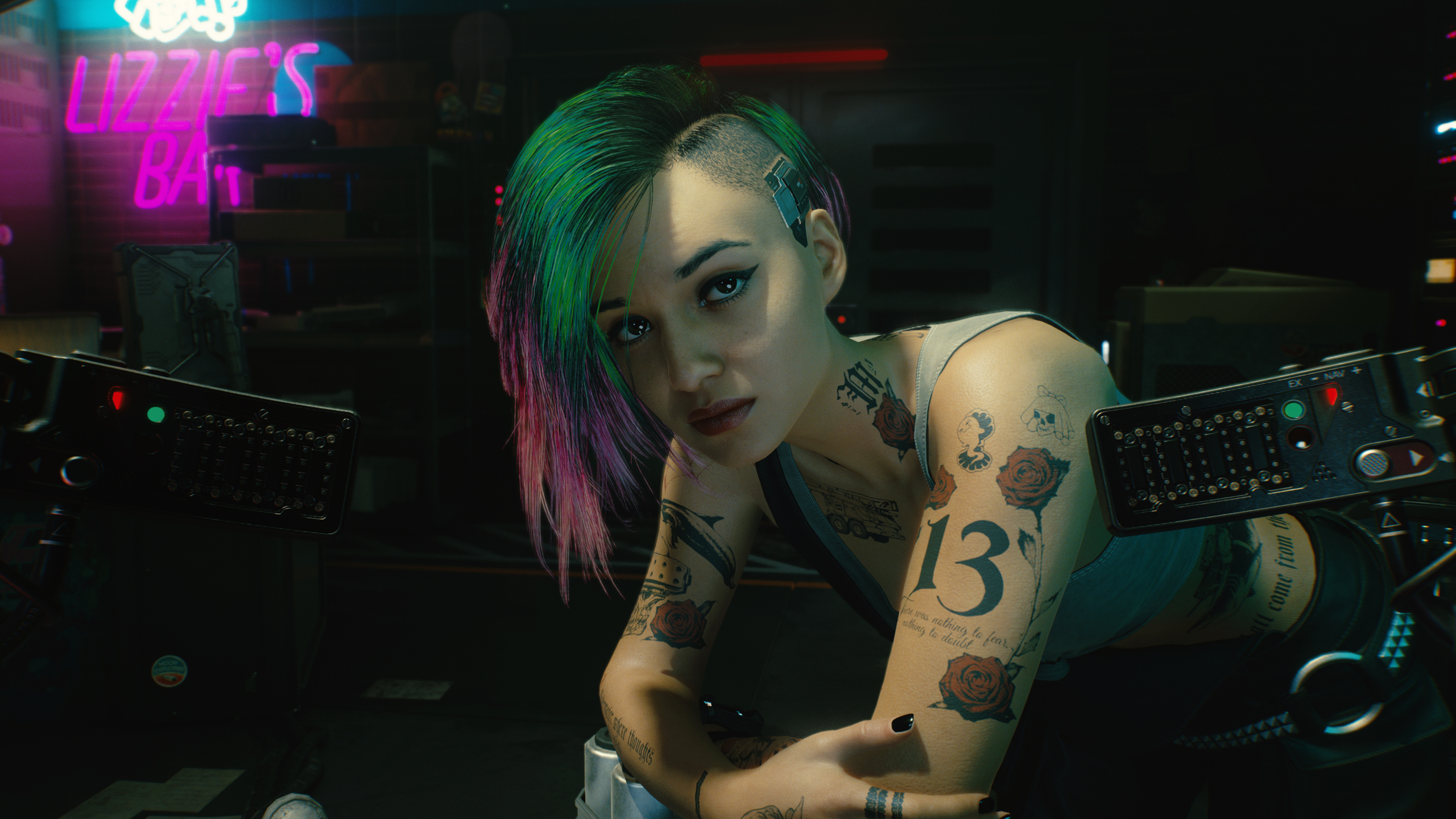
On the outskirts of Night City lie the Badlands. This vast expanse of barren desert, Joshua trees, and low, sloping hills is scattered with dried-up oil fields, heaps of scrap, and rough, isolated towns. Old tarmac roads—built long ago before the world went to shit—criss-cross the landscape, partially buried in sand. And far in the distance, through a dusty blue haze, I can just about see the monolithic skyscrapers and holographic billboards of the city. But that comes later. For now, I'm stuck in this backwater no man's land.
Cyberpunk 2077 features three distinct life paths, which determine your starting area and your relationship with the world. I'm given the choice to play as a street kid, a corporate agent, or a wandering nomad. I choose the latter and find myself in a dingy garage in one of those remote Badlands towns, staring into a filthy mirror. I tear a patch from my leather jacket, the emblem of the Nomad gang I used to run with—a lifestyle change I'll learn more about later in the game. I'm a lone wolf now. Well, I would be if my car would start.
Check out some new Cyberpunk 2077 gameplay in the video above. Also on YouTube.
My ride, which looks like a vintage 1980s rally hatchback retro-fitted with high-tech parts, has broken down. The mechanic is struggling to make sense of my customised engine, so I step in. Nomads rely on their vehicles for survival, which means I'm pretty handy with a wrench. I mess around in the hood, swapping some wires around, then climb into the driver's seat and start the engine. It roars to life, but before I can drive away, the local sheriff strolls in, puts one leg on the bumper, and asks me what I'm doing in his town.
He's the classic suspicious smalltown sheriff. Ten-gallon hat, gleaming gold badge, aviator shades hiding his eyes, air of superiority. But I also notice that he has augmented hands, and the band of his hat is fitted with some kind of electronic device. A camera, perhaps? Already I'm impressed by the level of detail in Cyberpunk 2077, and how layered it feels; as if this modern technology has been grafted, not quite seamlessly, onto an existing world.
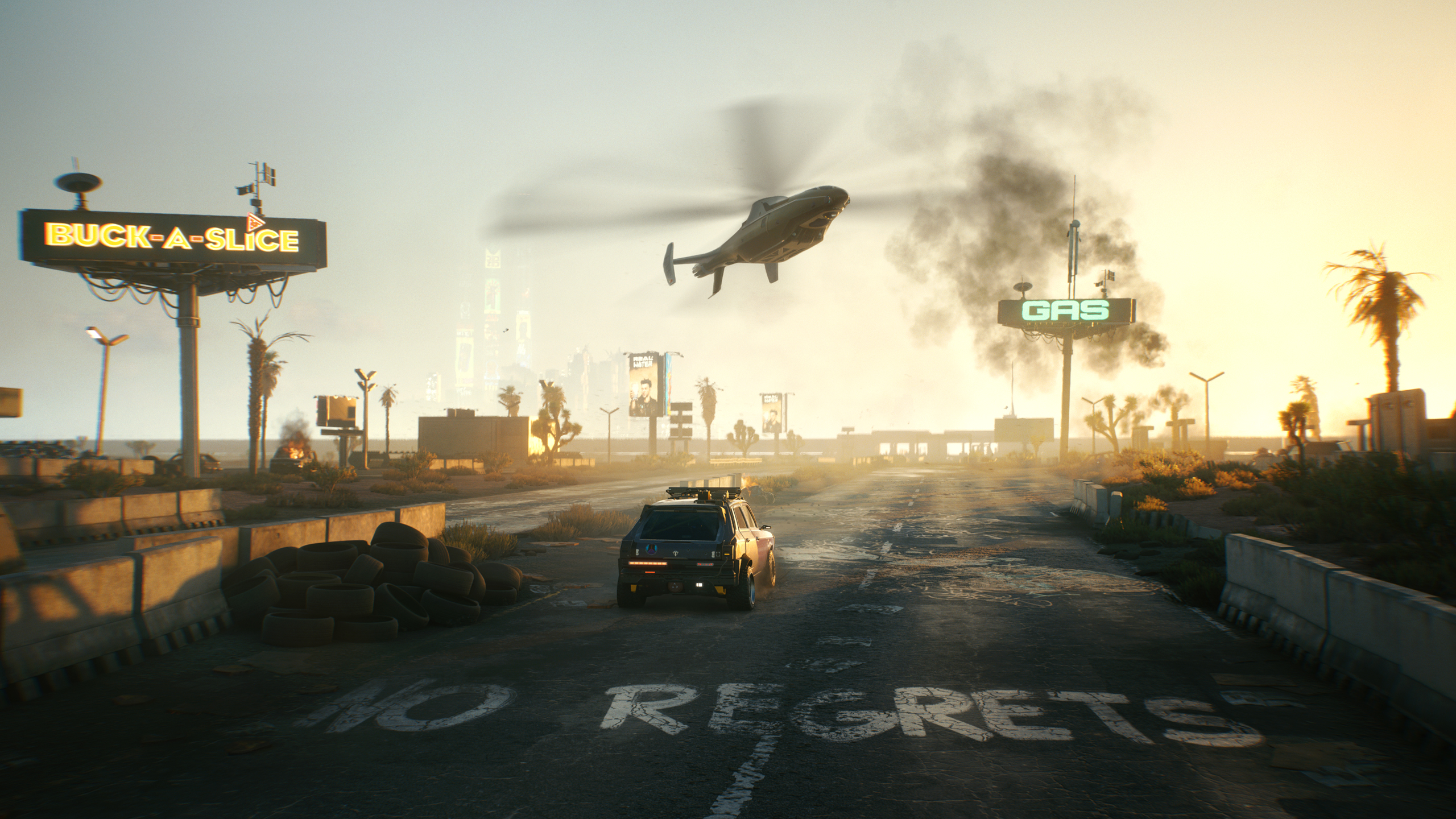
I'm surprised by how enjoyable Cyberpunk 2077 is when you're behind the wheel
The sheriff grills me, and I can be as rude or polite as I want back. He seems to have something against Nomads; doubly so Nomads who have gone rogue. "You're an outcast among outcasts," he says, spitting. In return I call him out for being a corporate stooge. "The corps pay you and have you on a leash like a dog, you know that?" But he brushes the insult off. The corps brought law and order to the Badlands, he says, and he intends to keep it that way. Before things get too tense, he backs down and tells me to get out of town, and I oblige, gladly.
The garage door folds open and I drive out into the town; a narrow strip of ramshackle buildings surrounded by an ocean of sand. There's a gas station, a diner, a few trailers messily wired up to bent electricity poles, and rusty, retro-fitted cars parked at the edges of the road. I jam the accelerator and speed out into the desert, getting a sense of the vehicle handling. It has a nice weight and bounce to it, and slamming the handbrake to transition into a drift feels great. I spend a while bombing down long, straight desert highways, occasionally veering off-road to bounce over scrubby hills, and I'm surprised by how enjoyable Cyberpunk 2077 is when you're behind the wheel.
The biggest gaming news, reviews and hardware deals
Keep up to date with the most important stories and the best deals, as picked by the PC Gamer team.
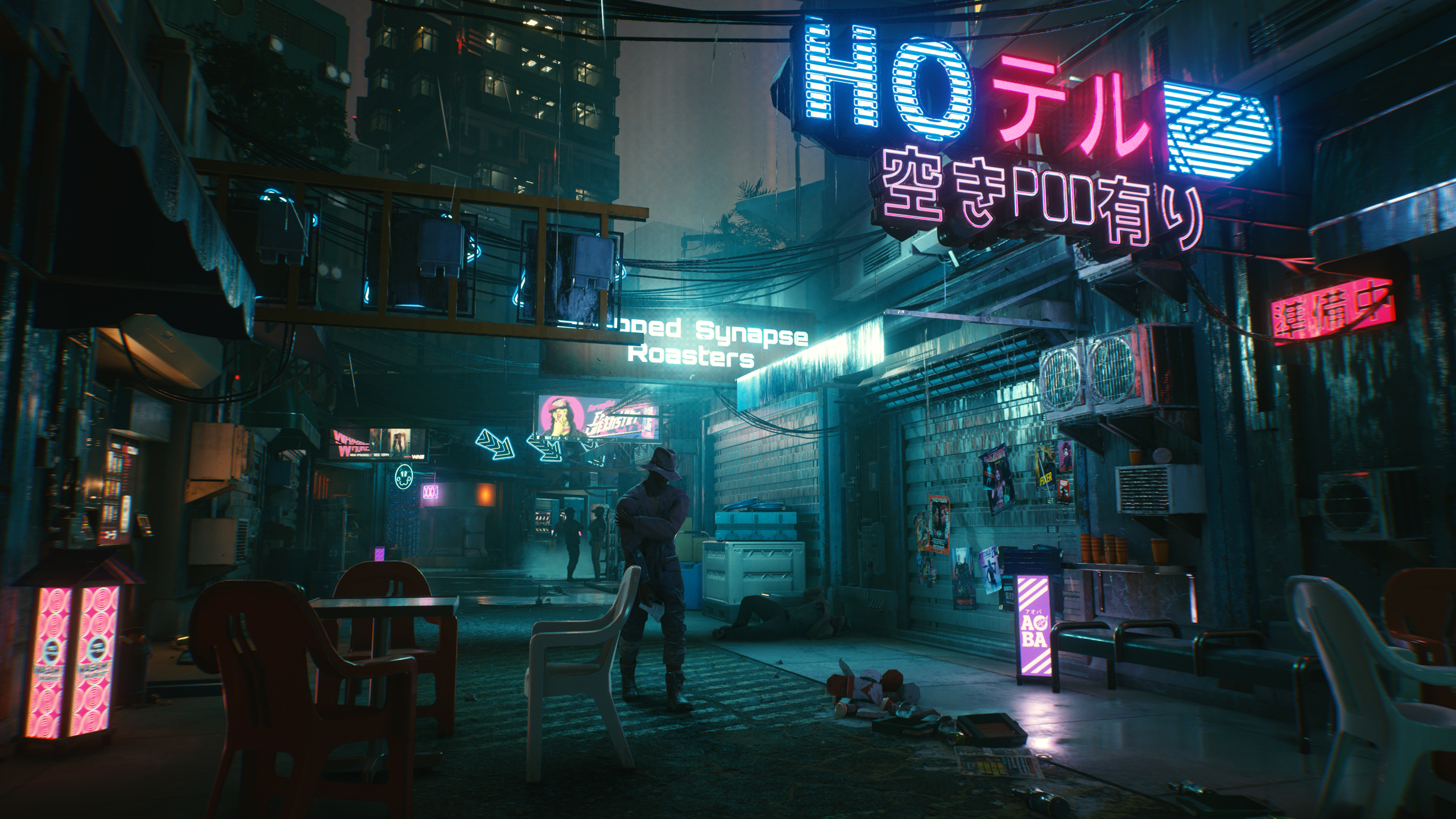
But I'm out here for a reason. I've agreed to smuggle something into Night City; my first job as a solo Nomad. I climb a radio tower overlooking the town and gaze across the desert at the unmistakable silhouette of the Night City skyline, which wobbles softly in the heat. Over a crackling radio my fixer, Willie, tells me where the package is. But he won't tell me what it is: only that I have to pick it up from a guy called Jackie Welles, who's holed up in a nearby trailer. I'll let you discover how this job plays out, but when the dust settles, you and Jackie become friends and associates—eventually leading to you relocating to Night City, which marks the end of the Nomad intro. But don't worry: you can return to the Badlands later in the game, and there will be missions there.
Six months have passed, and we join V (that's you) and Jackie on a job in the city. A fixer's client has been plucked off the street by scavengers; criminals who kidnap people, cut out their implants, and sell them on the black market. CD Projekt RED showed us this mission back in 2018, in the first gameplay reveal, so I'll skip over the details. Afterwards, Jackie drives me home, to an area of Night City called Watson. This crowded, diverse district has a strong Asian influence, with people living in colossal skyscrapers and megabuildings abandoned by the corporations. My apartment is in one of these gargantuan structures, near the top, and I get a stunning view of the city when I open the blinds and look through the window. The scale of everything is mindblowing.
I gaze across the desert at the unmistakable silhouette of the Night City skyline
Now, this is the moment I've been waiting for. After crashing for the night, the next morning I weave through the crowded corridors of the massive apartment complex, take the elevator to the main entrance, and emerge into an impossibly busy city intersection. This is when Cyberpunk 2077 opens up and sets you free, and even though Jackie is waiting for me to start the next mission (and my time with the game is limited to a few hours), I can't resist taking some time out to explore this remarkable place. CDPR has shown this part of the city in trailers, but being there—moving through it at my own pace, spinning the camera around, stopping to look at the fine details, talking to passers by—takes it to another level.
I start my trip on foot, merging with a pulsing mass of people crossing a road. The Japanese influence on this part of Night City is obvious, and I'm reminded of visiting Tokyo, being marched by the crowd across the famously hectic Shibuya Crossing. It's a clear, sunny day, and I'm struck by how bright the place is. I crane the camera up and see skyscrapers stretching into the sky, of all different colours, loaded with neon signs and animated, holographic billboards. I also notice a light, dusty haze in the air—the same I saw shrouding the city from the Badlands—which reminds me that I'm in the Californian desert.
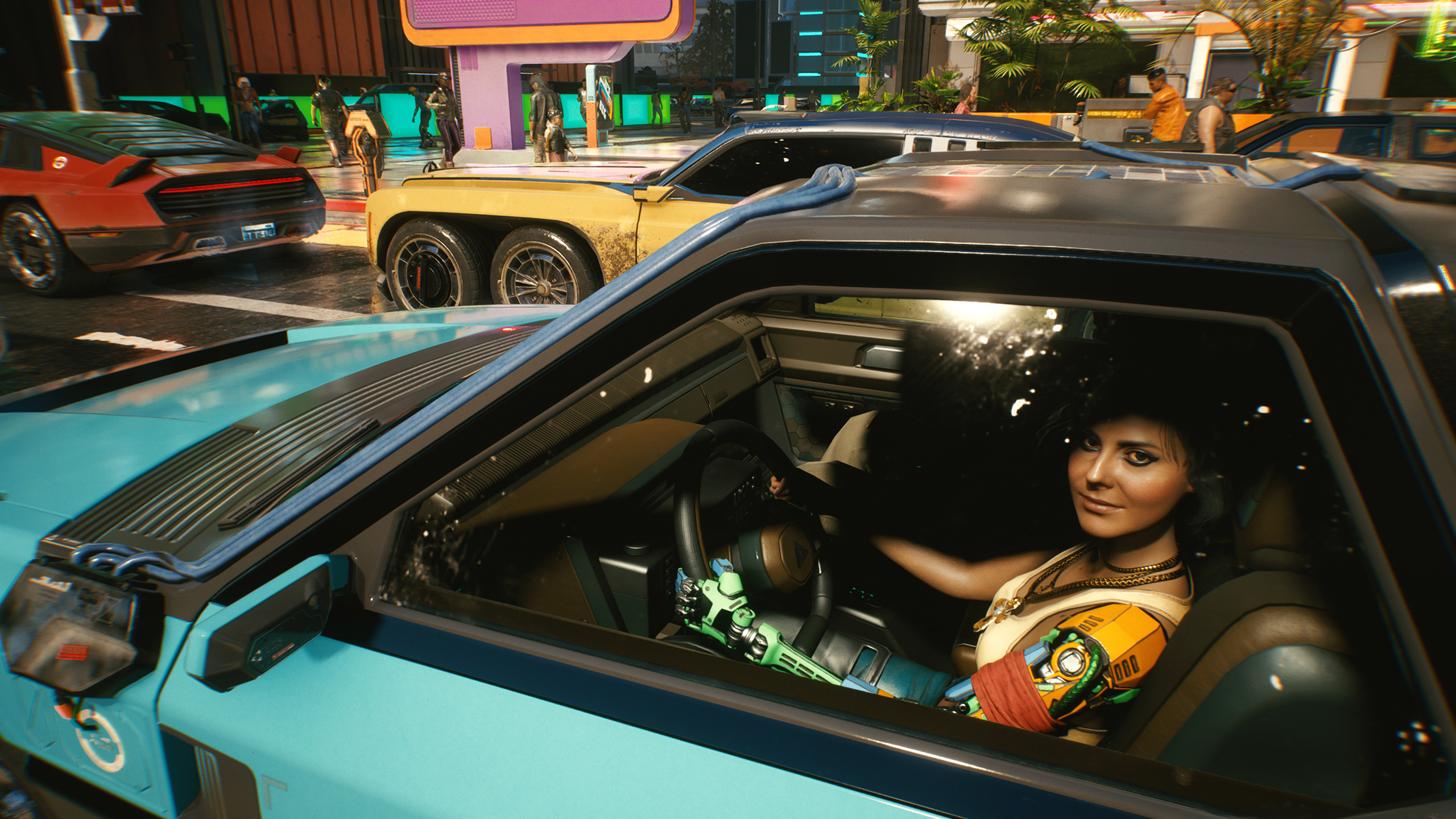
I slip down a side street and I'm reminded of another part of Tokyo: the Kabukichō red light district. The street is narrow but tall, with tangled webs of electricity cables stretching between buildings, rows of blinking vending machines vying for people's attention, overstuffed noodle bars, and an endless parade of pedestrians of all shapes, sizes, and colours. There are kids wandering around too, which you rarely see in open world games. You can talk to anyone, but most people only have one short, quippy line of dialogue. I also notice that some NPCs get freaked out if you hang around them for too long, with one guy angrily accusing me of following him when I spend a little too much time admiring the detail on his gold-plated mechanical hand.
The variety of NPCs is extraordinary, and I keep stopping to check out Night City's wild futuristic fashions. I see transparent vinyl raincoats, fluorescent track pants, elaborate high-top sneakers, visors, Hawaiian shirts, shiny metallic leggings, and all manner of customised, coloured mechanical limbs. This, combined with everything else buzzing around me, makes Night City feel like a lively, vibrant, living place. It's when I catch myself reading individual cover lines on magazines in a seedy backstreet shop (BALLSY promises readers 'the hottest sex workout') that I decide it's time to travel further afield, and I hit a button that calls up my car, like Geralt whistling for Roach.
The variety of NPCs is extraordinary, and I keep stopping to check out Night City's wild futuristic fashions
The car, a Quadra Turbo-R, comes skidding along the street and stops near me, honking its own horn to announce its arrival, which is a cute touch. When I get behind the wheel, I notice that it handles very differently from the bouncy little rally car I drove back in the desert. It feels more like a supercharged sports car, and I love the low, slightly fish-eyed third-person view, which gives an added sense of power and speed. You can also drive in first-person, which lets you admire the car's amazingly detailed dashboard. Tearing around Watson's dense, packed, intricate streets in this thing feels sensational. I'm also thankful for the slightly rubbery, forgiving physics, which let me slam into scenery, obstacles, and other traffic without losing much momentum.
When I hit the map button I'm presented with a wireframe 3D model of the city that I can rotate. Optional missions come in a lot of different flavours, but side jobs and gigs seem to be the main ones. Gigs are substantial, story-driven side missions. Similar to The Witcher 3's fun, unpredictable side quests, seemingly simple jobs can unravel, evolve, and turn into something much bigger and more complex. Side jobs, on the other hand, are smaller, more immediate moments, like dealing with someone who has overloaded themselves with augmentations and is suffering from cyberpsychosis. You can also hack into the NCPD police database to hunt for wanted citizens and collect the bounty money, and I saw a few random gang fights break out on the street too.
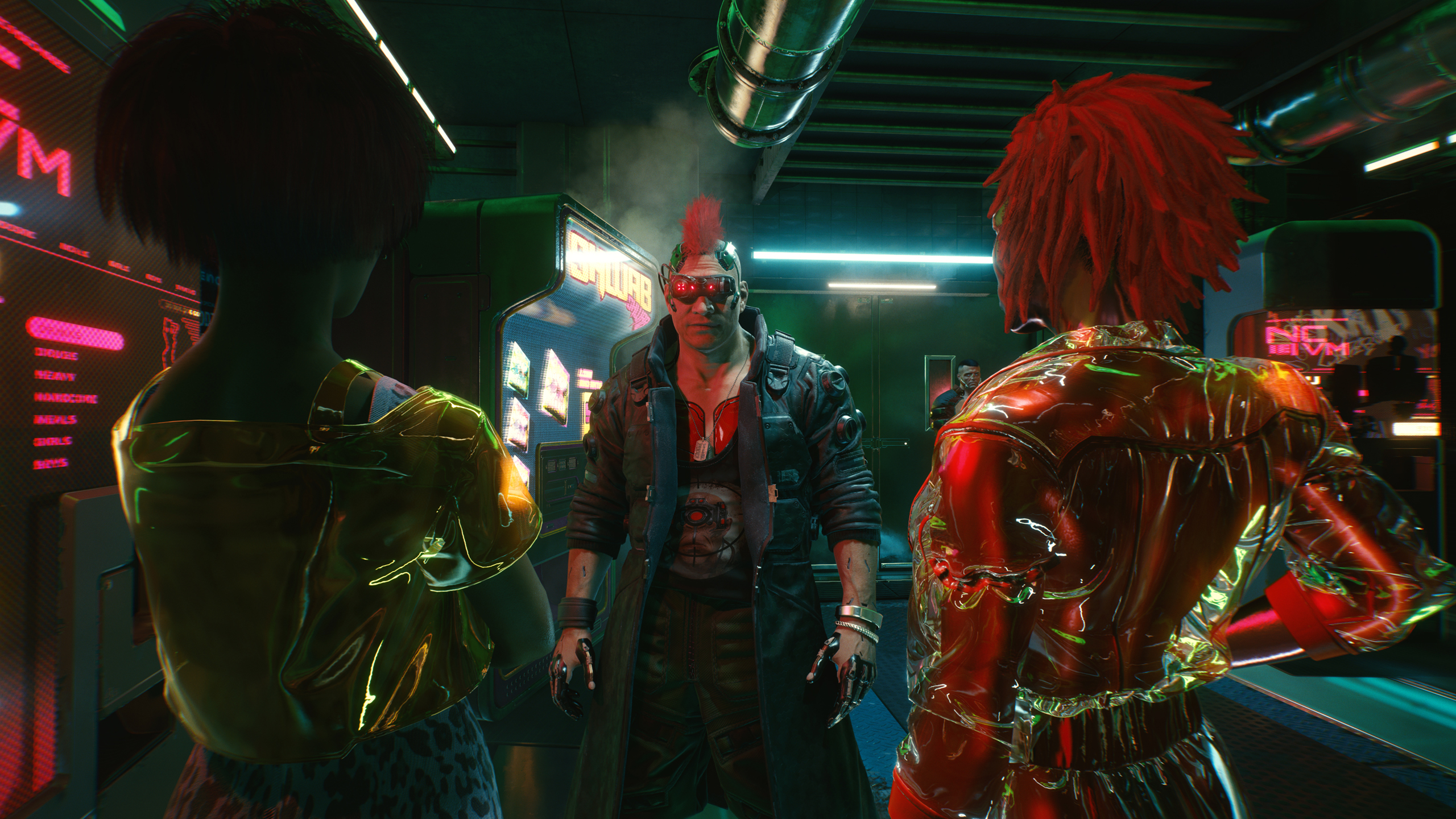
The game also features a day/night cycle, and seeing the city at night for the first time is a special moment. It never really gets dark in Watson, with the relentless glow of those neon signs and holo-billboards bouncing off the clouds, draping the city in a cold blue light. But it's dark enough to completely transform the mood of the streets—especially when it rains and the city is reflected in puddles on the road. When the sun sets, the city takes on a darker edge, and it's worth getting out of your car, picking a beauty spot, and just watching (and listening to) the world go by. The sense of place is incredible.
I could spend another hour driving around the city, but it's time to dive into some missions. I hook up with Jackie and we meet Dexter DeShawn, a respected local fixer with a potentially lucrative job for us; and one that, if it goes well, will establish Jackie and V as major up-and-coming players in Night City. Again, I'll let you discover the details of the job yourself when you play the game. But I will say that it involves ripping off the powerful, ruthless CEO of one of the biggest megacorporations in Night City. However, before you can pull off the heist, you need to complete a couple of important prep missions.
Night City is not a subtle place; a reflection of its hedonistic, hyper-consumerist culture
My first port of call is Lizzie's Bar, a gaudy backstreet nightclub famous for its braindances: a popular form of neural entertainment that lets you experience emotions and memories through a headset called a wreath. There are all kinds of braindances (including, for the truly morbid, recordings of people dying), but Lizzie's specialises in the, well, horny kind. The club doesn't open till 6pm, so I use the game's time skip feature (think meditating in The Witcher 3) until the doors open. Inside I see the words FUCK TO DEATH written in pink neon above the cloakroom, which makes quite a first impression. Night City is not a subtle place; a reflection of its hedonistic, hyper-consumerist culture.
I follow the sound of thumping bass and make my way to the bar. The club is a lurid, sensory explosion of pink and purple, with spindly lasers scanning the room, fluorescent strip lights, and a large mural on a wall depicting a gang of gun-toting skeletons. In every corner there are throngs of people drinking and dancing in expensive-looking outfits, and staff (who are just as colourfully dressed) serving cocktails from glowing neon trays. I grab a stool at the bar and meet with Evelyn Parker, a mysterious woman hired by Dexter to help me with the heist. I'm not sure who she is, but she has friends in high places.
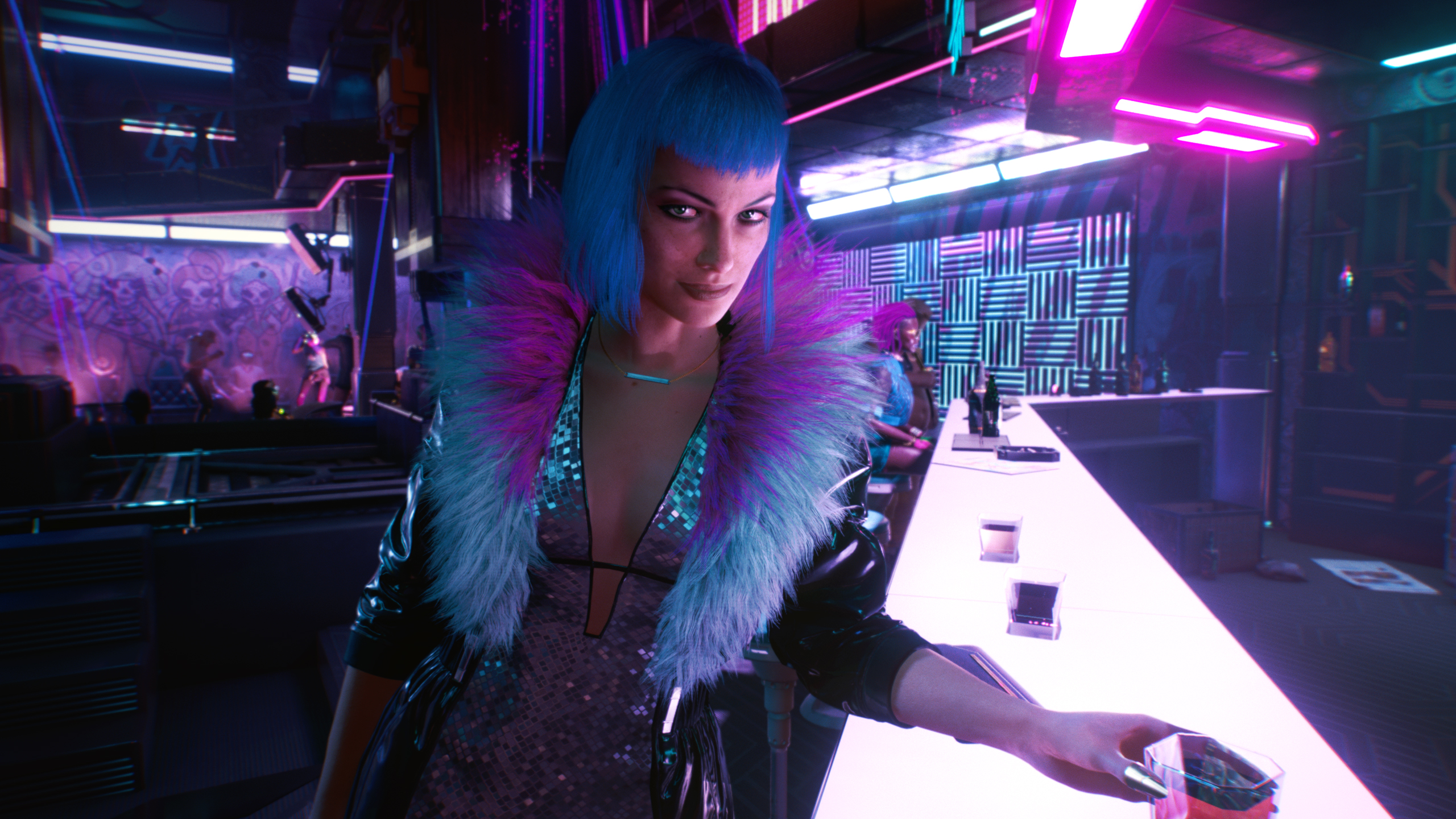
Evelyn leads me through the club's back rooms, past rows of booths, some of which are open. I sneak a look inside and see clients in the throes of braindance-induced ecstasy. They sit slumped on leather sofas, headsets glowing, dead to the world. Evelyn takes me to the club's basement and introduces me to braindance expert Judy Alvarez. The CEO we're ripping off has a valuable item hidden in his penthouse, and we have to find out where it is. Lucky for us, Evelyn is currently enjoying a no strings attached sexual relationship with him, and last time she visited the apartment she recorded a BD of the place.
Judy snaps a headset on me, and suddenly I'm in the CEO's lavish penthouse, viewing it through Evelyn's eyes. I'm able to scrub back and forth through her memory, rewinding, pausing, and fast forwarding to pick out details that might reveal the location of the object Dexter wants. I can also switch between three different layers: visual, audio, and thermal. I have to be a detective here, hunting for clues to where he might be stashing the item. At one point the CEO is on the phone, and I can scan it to listen in on the other side of the conversation. Later, determining that the object has to be kept at a low temperature, I use the thermal layer of the BD to locate cold spots in the penthouse.
I sneak a look inside and see clients in the throes of braindance-induced ecstasy
With the reconnaissance done, I have one more job to do before I can attempt the heist: recovering a powerful remote-controlled spider-bot from the Maelstrom gang. This is another mission CDPR has shown off in detail before, so I won't spend too much time talking about it. But it's an example of how there are many ways to approach objectives. You can simply pay for the bot and leave, but I decide to keep the money for myself, grab the merchandise, and shoot my way out of the joint. I also kill the Maelstrom leader, Royce, before he's even slightly aware of my plan to turn on him, which saves me having to face him in a boss fight later.
I tried my best not to shoot anyone. Stealth is always a valid option in Cyberpunk 2077, and I manage to sneak through some parts of the Maelstrom hideout without being tagged. But then I find a tech shotgun. There are three categories of guns: power weapons are standard firearms of the bullet-shooting variety; smart weapons launch self-guided missiles, locking onto targets automatically; and tech weapons, like the double-barreled shotgun I just picked up, use magnets to launch projectiles at incredibly high speeds. And this thing feels absolutely deadly in my hands, sending enemies flying backwards, shredding their armour. So I end up using that to escape with the bot.
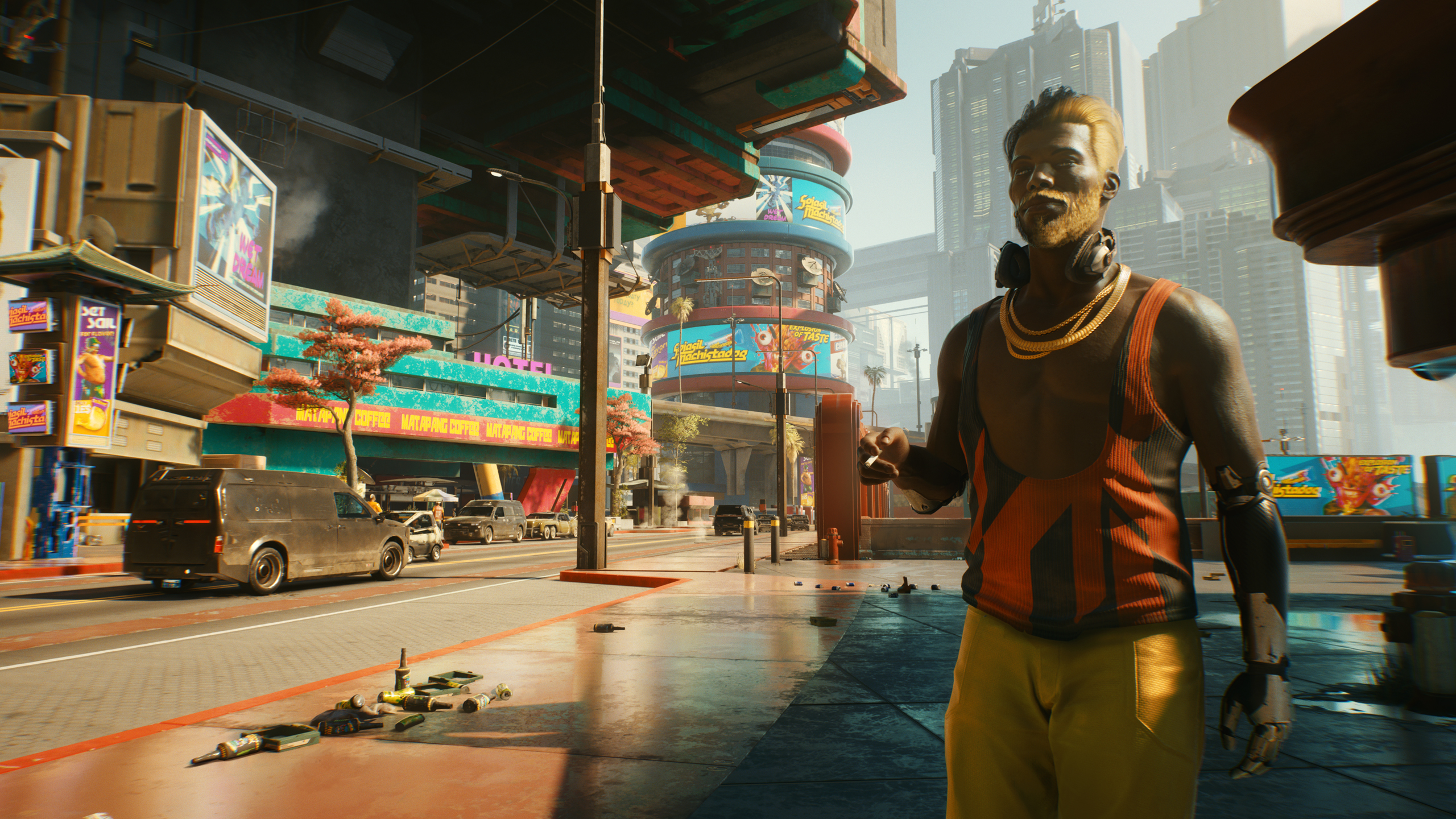
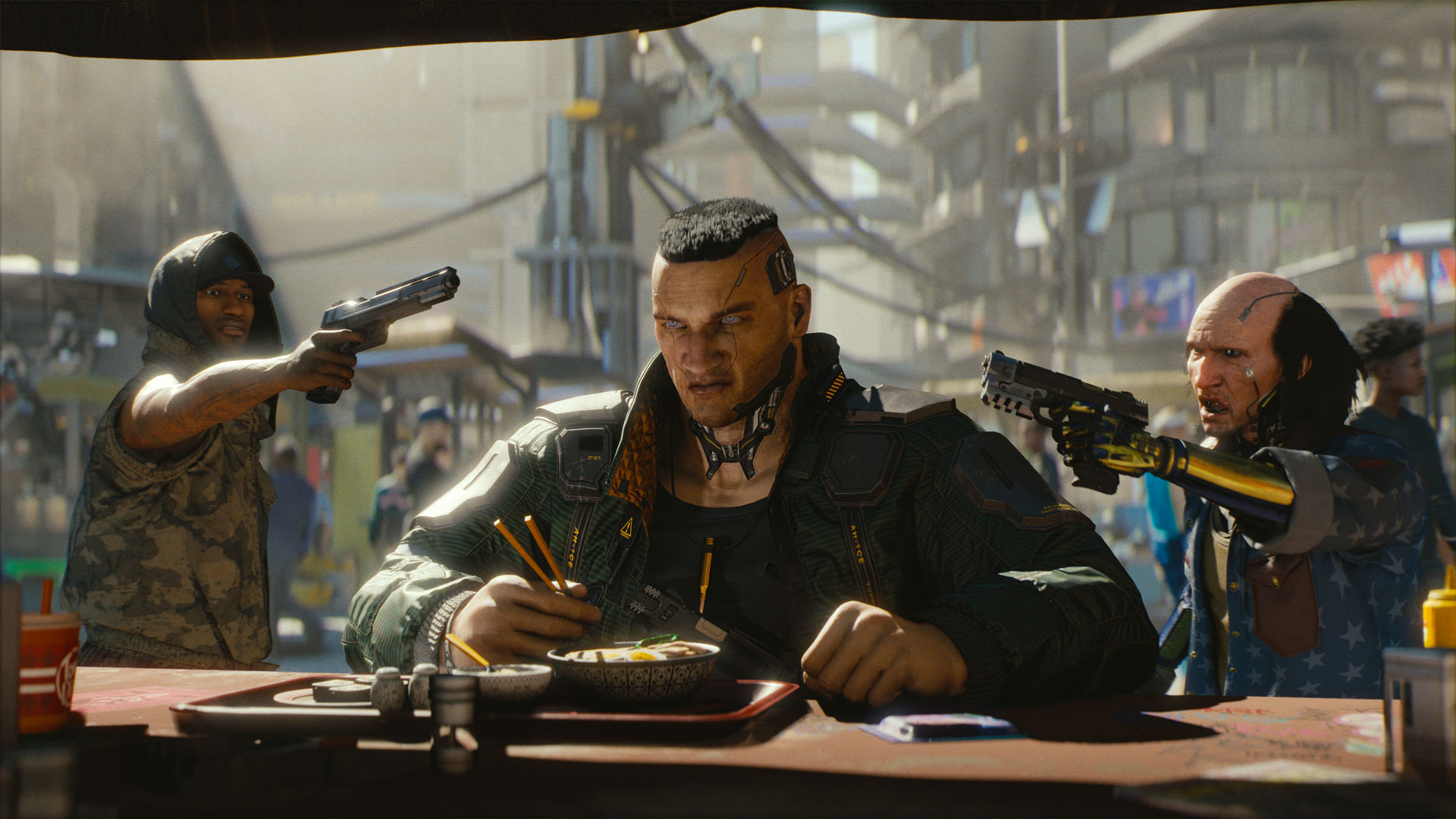
Cyberpunk 2077 lifepaths: Which to choose
Cyberpunk 2077 map: What you need to know
Cyberpunk 2077 romance options
Cyberpunk 2077 builds: Best so far
Cyberpunk 2077 Braindance: How it works
Cyberpunk 2077 cars: Race around Night City
Cyberpunk 2077 hacking: How to do it
You could also infect the Maelstrom goons with a virus, using a corrupted credit chip given to you by the sinister Militech corporation. But do you really want to get into bed with an outfit like that? Then again, they could be a powerful ally later down the line. Choices like this, and the consequences that ripple out from them, are a big part of Cyberpunk 2077. Alas, my demo wasn't long enough to witness this aspect of the game for myself. Having successfully secured the spider-bot, Jackie and I jump in the Quadra and head to a Watson nightclub called Afterlife to give Dexter the good news.
Afterlife is probably Night City's most famous watering hole. When I enter, Jackie excitedly lists all the legendary mercenaries and fixers who have been patrons over the years. Normally we wouldn't be allowed in here, drinking alongside the veteran cyberpunks. But working with Dexter, our foot is in the door—literally and figuratively. In another example of Cyberpunk 2077's imaginative world-building, the club used to be a morgue years ago, and people are using the pulled-out slabs as tables. Jackie jokes with the bartender about having a drink named after him one day as we're taken to a private, soundproofed room to see Dexter. This place is fully equipped for secret meetings.
Plans for the heist are made, but annoyingly, this is the end of my time with the game. I have ten minutes left, so I drive around the city some more. The sun is setting, casting a golden glow over the teeming streets of Watson. I pan the camera around the car as I drive, watching the dipping sunlight glint off the bodywork, speeding past palm trees, sex clubs, noodle stands, and other tantalising glimpses of Night City life. And I'm struck by the realisation that all of this—everything I've seen so far—is just one district. If the rest of the city is as dense, layered, and brimming with distractions as this, Cyberpunk 2077 is going to devour a large chunk of my life. And I'm going to let it.
If it’s set in space, Andy will probably write about it. He loves sci-fi, adventure games, taking screenshots, Twin Peaks, weird sims, Alien: Isolation, and anything with a good story.


